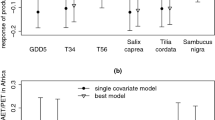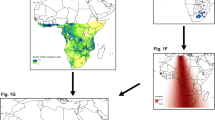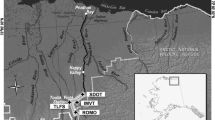Abstract
Climate change is altering global temperature and precipitation regimes, and the ability of species to respond to these changes could have serious implications for population dynamics. Flexible species may adjust breeding dates in response to advances in spring phenology. Furthermore, in migratory bird species, conditions experienced during the non-breeding season may have cross-seasonal effects during the subsequent breeding season. We evaluated species-specific responses to antecedent non-breeding (winter) and current breeding (spring) conditions. We used a data set composed of 21,230 duck nests from 164 sites in the Canadian Prairie Pothole Region, 1993–2011, to determine how environmental conditions influenced timing of nesting and subsequent nest survival in eight duck species representing varying life-histories. We tested how species responded in timing of nesting and nest survival, respectively, to El Niño Southern Oscillation (ENSO) conditions experienced during the preceding non-breeding season (winter; Dec–Feb), and spring (Mar–Jun) temperature and moisture conditions on the breeding grounds. Ducks tended to nest earlier in warmer springs; however, in El Niño winters, with warmer spring temperatures, nesting tended to be later. We did not find evidence for direct effects of environmental variables on nest survival; however, evidence of indirect effects of winter conditions on nest survival for some species via strong direct effects on timing of nesting provides new insights into mechanisms for cross-seasonal effects on reproductive success.

Similar content being viewed by others
References
Ahola M, Laaksonen T, Sippola K, Eeva T, Rainio K, Lehikoinen E (2004) Variation in climate warming along the migration route uncouples arrival and breeding dates. Glob Change Biol 10:1610–1617. https://doi.org/10.1111/j.1365-2486.2004.00823.x
Arnold TW (2010) Uninformative parameters and model selection using Akaike’s information criterion. J Wildl Manag 74:1175–1178. https://doi.org/10.2193/2009-367
Arzel C, Dessborn L, Pöysä H, Eeva T, Rainio K, Lehikoinen E (2014) Early springs and breeding performance in two sympatric duck species with different migration strategies. Ibis 156:288–298. https://doi.org/10.1111/ibi.12134
Balbontín J, Møller AP, Hermosell IG, Marzal A, Reviriego M, de Lope F (2009) Individual responses in spring arrival date to ecological conditions during winter and migration in a migratory bird. J Anim Ecol 78:981–989. https://doi.org/10.1111/j.1365-2656.2009.01573.x
Beaubien EG, Freeland HJ (2000) Spring phenology trends in Alberta, Canada: links to ocean temperature. Int J Biometeorol 44:53–59. https://doi.org/10.1007/s004840000050
Blums P, Clark RG, Mednis A (2002) Patterns of reproductive effort and success in birds: path analyses of long-term data from European ducks. J Anim Ecol 71:280–295. https://doi.org/10.1046/j.1365-2656.2002.00598.x
Both C, Visser ME (2001) Adjustment to climate change is constrained by arrival date in a long-distance migrant bird. Nature 411:296–298. https://doi.org/10.1038/35077063
Burnham KP, Anderson DR (2002) Model selection and multimodel inference: a practical information-theoretic approach. Springer Press, New York
Clark RG, Pöysä H, Runko P, Paasivaara A (2014) Spring phenology and timing of breeding in short-distance migrant birds: phenotypic responses and offspring recruitment patterns in common goldeneyes. J Avian Biol 45:457–465. https://doi.org/10.1111/jav.00290
Cotton PA (2003) Avian migration phenology and global climate change. Proc Natl Acad Sci 100:12219–12222. https://doi.org/10.1073/pnas.1930548100
Dawson RD, Clark RG (2000) Effects of hatching date and egg size on growth, recruitment, and adult size of lesser scaup. Condor 102:930–935. https://doi.org/10.1650/0010-5422(2000)102%5b0930:eohdae%5d2.0.co;2
Devries JH, Brook RW, Howerter DW, Anderson MG (2008) Effects of spring body conditions and age on reproduction in mallards (Anas platyrhynchos). Auk 125:618–628. https://doi.org/10.1525/auk.2008.07055
Doherty KE, Howerter DW, Devries JH, Walker J (2018) Prairie pothole region of North America. In: Finlayson CM, Milton GR, Prentice RC, Davidson NC (eds) The wetland book, vol II. Distribution, description and conservation. Springer, New York, pp 679–688
Drever MC, Clark RG (2007) Spring temperature, clutch initiation date and duck nest success: a test of the mismatch hypothesis. J Anim Ecol 76:139–148. https://doi.org/10.1111/j.1365-2656.2006.01183.x
Dzus EH, Clark RG (1998) Brood survival and recruitment of mallards in relation to wetland density and hatching date. Auk 115:311–318. https://doi.org/10.2307/4089189
Emery RB, Howerter DW, Armstrong LM, Anderson MG, Devries JH, Joynt BL (2005) Seasonal variation in waterfowl nesting success and its relation to cover management in the Canadian prairies. J Wildl Manag 69:1181–1193. https://doi.org/10.2193/0022-541x(2005)069%5b1181:sviwns%5d2.0.co;2
Gloutney ML, Clark RG, Afton AD, Huff GJ (1993) Timing of nest searches for upland nesting waterfowl. J Wildl Manag 57:597–601. https://doi.org/10.2307/3809288
Gordo O, Brotons L, Ferrer X, Comas P (2005) Do changes in climate patterns in wintering areas affect the timing of the spring arrival of trans-Saharan migrant birds? Glob Change Biol 11:12–21. https://doi.org/10.1111/j.1365-2486.2004.00875.x
Götmark F (1992) The effects of investigator disturbance on nesting birds. Curr Ornithol 9:61–104
Greenwood RJ, Sargeant AB, Johnson DH, Cowardin LM, Shaffer TL (1995) Factors associated with duck nest success in the prairie pothole region of Canada. Wildl Monogr 128:3–57
Guillemain M, Pöysä H, Fox AD, Arzel C, Dessborn L, Ekroos J, Gunnarsson G, Holm TE, Christensen TK, Lehikoinen A, Mitchell C, Rintala J, Møller AP (2013) Effects of climate change on European ducks: what do we know and what do we need to know? Wildl Biol 19:404–419. https://doi.org/10.2981/12-118
Gurney KEB, Wood CJ, Alisauskas RT, Wayland M, DeVink J-MA, Slattery SM (2014) Identifying carry-over effects of wintering area on reproductive parameters in White-winged Scoters: an isotopic approach. Condor 116:251–264. https://doi.org/10.1650/CONDOR-13-082.1
Hammond MC, Johnson DH (1984) Effects of weather on breeding ducks in North Dakota. US Department of the Interior Fish and Wildlife Service, Fish and Wildl Technical Rep No. 1
Harris I, Jones PD, Osborn TJ, Lister DH (2014) Updated high-resolution grids of monthly climatic observations—the CRU TS3.10 Dataset. Int J Climatol 34:623–642. https://doi.org/10.1002/joc.3711
Harrison XA, Blount JD, Inger R, Norris DR, Bearhop S (2011) Carry-over effects as drivers of fitness differences in animals. J Anim Ecol 80:4–18. https://doi.org/10.1111/j.1365-2656.2010.01740.x
Heitmeyer ME, Fredrickson LH (1981) Do wetland conditions in the Mississippi Delta hardwoods influence mallard recruitment? In: Sabol K (ed) Transactions of the forty-sixth North American Wildlife and Natural Resources Conference. Wildlife Management Institute, Washington DC, pp 44–57
Howerter DW, Anderson MG, Devries JH, Joynt BL, Armstrong LM, Emery RB, Arnold TW (2014) Variation in mallard vital rates in Canadian Aspen Parklands: the Prairie Habitat Joint Venture Assessment. Wildl Monogr 188:1–37. https://doi.org/10.1002/wmon.1012
Hughes L (2000) Biological consequences of global warming: is the signal already apparent? Trends Ecol Evol 15:56–61. https://doi.org/10.1016/S0169-5347(99)01764-4
Kaminski RM, Gluesing EA (1987) Density- and habitat-related recruitment in mallards. J Wildl Manag 51:141–148. https://doi.org/10.2307/3801645
Kirtman B, Power SB, Adedoyin JA, Boer GJ, Bojariu R, Camilloni I, Doblas-Reyes FJ, Fiore AM, Kimoto M, Meehl GA, Prather M, Sarr A, Schär C, Sutton R, van Oldenborgh GJ, Vecchi G, Wang HJ (2013) Near-term climate change: projections and predictability. In: Stocker TF, Qin D, Plattner GK, Tignor M, Allen SK, Boschung J, Nauels A, Xia Y, Bex V, Midgley PM (eds) Climate change 2013: the physical science basis. contribution of working group I to the fifth assessment report of the intergovernmental panel on climate change. Cambridge University Press, Cambridge
Klett AT, Duebbert HF, Faanes CA, Higgins KF (1986) Techniques for studying nest success of ducks in upland habitats in the Prairie Pothole Region. Fish and Wildlife Service Resources Publication, Washington, p 158
Klett AT, Shaffer TL, Johnson DH (1988) Duck nest success in the Prairie Pothole Region. J Wildl Manag 52:431–440. https://doi.org/10.2307/3801586
Knudsen E, Lindén A, Both C, Jonzén N, Pulido F, Saino N, Sutherland WJ, Bach LA, Coppack T, Ergon T, Gienapp P, Gill JA, Gordo O, Hendenström A, Lehikoinen E, Marra PP, Møller AP, Nilsson ALK, Péron G, Ranta E, Rubolini D, Sparks TH, Spina F, Studds CE, Sæther SA, Tryjanowski P, Stenseth NC (2011) Challenging claims in the study of migratory birds and climate change. Biol Rev 86:928–946. https://doi.org/10.1111/j.1469-185X.2011.00179.x
Langford WA, Driver EA (1979) Quantification of the relationship between mallard nest initiation and temperature. Wildfowl 30:31–34
Lehikoinen A, Kilpi M, Ost M (2006) Winter climate affects subsequent breeding success of common eiders. Glob Change Biol 12:1355–1365. https://doi.org/10.1111/j.1365-2486.2006.01162.x
Lehikoinen A, Jaatinen K, Vähätalo AV, Clausen P, Crowe O, Deceuninck B, Hearn R, Holt CA, Hornman M, Keller VA, Nilsson L, Langendoen T, Tománkova I, Wahl J, Fox AD (2013) Rapid climate driven shifts in wintering distributions of three common waterbirds. Glob Change Biol 19:2071–2081. https://doi.org/10.1111/gcb.12200
Marra PP, Hobson KA, Holmes RT (1998) Linking winter and summer events in a migratory bird by using stable-carbon isotopes. Science 282:1884–1886. https://doi.org/10.1126/science.282.5395.1884
Mayfield HF (1975) Suggestions for calculating nest success. Wilson Bull 87(4):456–466
Mazerolle DF, Sealy SG, Hobson KA (2011) Interannual flexibility in breeding phenology of a neotropical migrant songbird in response to weather conditions at breeding and wintering areas. Ecoscience 18:18–25. https://doi.org/10.2980/18-1-3345
McKellar AE, Marra PP, Hannon SJ, Studds CE, Ratcliffe LM (2013) Winter rainfall predicts phenology in widely separated populations of a migrant songbird. Oecologia 172:595–605. https://doi.org/10.1007/s00442-012-2520-8
Mehl KR, Alisauskas RT, Hobson KA, Kellett DK (2004) To winter east or west? Heterogeneity in winter philopatry in a central-Arctic population of king eiders. Condor 106:241–251. https://doi.org/10.1650/7356
Møller AP, Rubolini D, Lehikoinen E (2008) Populations of migratory bird species that did not show a phenological response to climate change are declining. Proc Natl Acad Sci 105:16195–16200. https://doi.org/10.1073/pnas.0803825105
Moussus J-P, Clavel J, Jiguet F, Julliard R (2011) Which are the phenologically flexible species? A case study with common passerine birds. Oikos 120:991–998. https://doi.org/10.1111/j.1600-0706.2010.18955.x
Murphy-Klassen HM, Underwood TJ, Sealy SG, Czyrnyj AA (2005) Long-term trends in spring arrival dates of migrant birds at Delta Marsh, Manitoba, in relation to climate change. Auk 122:1130–1148. https://doi.org/10.1642/0004-8038(2005)122%5b1130:ltisad%5d2.0.co;2
Ockendon N, Leech D, Pearce-Higgins JW (2013) Climatic effects on breeding grounds are more important drivers of breeding phenology in migrant birds than carry-over effects from wintering grounds. Biol Lett 9:20130669. https://doi.org/10.1098/rsbl.2013.0669
Oja H, Pöysä H (2007) Spring phenology, latitude, and the timing of breeding in two migratory ducks: implications of climate change impacts. Ann Zool Fenn 44:475–485
Osnas EE, Zhao Q, Runge MC, Boomer GS (2016) Cross-seasonal effects on waterfowl productivity: implications under climate change. J Wildl Manag 80:1227–1241. https://doi.org/10.1002/jwmg.21124
Palmer WC (1965) Meteorological drought. Department of Commerce Weather Bureau, Washington, p 45
Parmesan C, Yohe G (2003) A globally coherent fingerprint of climate change impacts across natural systems. Nature 421:37–42. https://doi.org/10.1038/nature01286
Paxton KL, Moore FR (2015) Carry-over effects of winter habitat quality on en route timing and condition of a migratory passerine during spring migration. J Avian Biol 46:495–506. https://doi.org/10.1111/jav.00614
Paxton KL, Cohen EB, Paxton EH, Németh Z, Moore FR (2014) El Niño-Southern Oscillation is linked to decreased energetic condition in long-distance migrants. PLoS One 9:e95383. https://doi.org/10.1371/journal.pone.0095383
Quiring SM, Papakryiakou TN (2003) An evaluation of agricultural drought indices for the Canadian prairies. Agric For Meteorol 118:49–62. https://doi.org/10.1016/S0168-1923(03)00072-8
R Core Team (2013) R: a language and environment for statistical computing. R Foundation for Statistical Computing, Vienna, Austria. http://www.R-project.org/
Rainio K, Laaksonen T, Ahola M, Vähätalo AV, Lehikoinen E (2006) Climatic responses in spring migration of boreal and arctic birds in relation to wintering area and taxonomy. J Avian Biol 37:507–515. https://doi.org/10.1111/j.0908-8857.2006.03740.x
Raquel AJ, Devries JH, Howerter DW, Alisauskas RT, Leach SW, Clark RG (2016) Timing of nesting of upland-nesting ducks in the Canadian prairies and its relation to spring wetland conditions. Can J Zool 94:575–581. https://doi.org/10.1139/cjz-2016-0021
Rathcke B, Lacey EP (1985) Phenological patterns of terrestrial plants. Ann Rev Ecol Syst 16:179–214
Rockwell SM, Bocetti CI, Marra PP (2012) Carry-over effects of winter climate on spring arrival date and reproductive success in an endangered migratory bird, Kirtland’s Warbler (Setophaga kirtlandii). Auk 129:744–752. https://doi.org/10.1525/auk.2012.12003
Rotella JJ, Dinsmore SJ, Shaffer TL (2004) Modeling nest-survival data: a comparison of recently developed methods that can be implemented in MARK and SAS. Anim Biodivers Conserv 27:187–205
Saino N, Szep T, Ambrosini R, Romano M, Møller AP (2004) Ecological conditions during winter affect sexual selection and breeding in a migratory bird. Proc R Soc Lond B 271:681–686. https://doi.org/10.1098/rspb.2003.2656
Schamber JL, Sedinger JS, Ward DH (2012) Carry-over effects of winter location contribute to variation in timing of nest initiation and clutch size in black brant (Branta bernicla nigricans). Auk 129:205–210. https://doi.org/10.1525/auk.2012.11249
Schummer ML, Cohen J, Kaminski RM, Brown ME, Wax CL (2014) Atmospheric teleconnections and Eurasian snow cover as predictors of a weather severity index in relation to Mallard Anas platyrhynchos autumn–winter migration. Wildfowl 4:451–469
Sedinger JS, Alisauskas RT (2014) Cross-seasonal effects and the dynamics of waterfowl populations. Wildfowl 4:277–304
Sedinger JS, Ward DH, Schamber JL, Butler WI, Eldridge WD, Conant B, Voelzer JF, Chelgren ND, Herzog MP (2006) Effects of El Niño on distribution and reproductive performance of black brant. Ecology 87:151–159. https://doi.org/10.1890/04-1013
Šeparović L, Alexandru A, Laprise R, Martynov A, Sushama L, Winger K, Tete K, Valin M (2013) Present climate and climate change over North America as simulated by the fifth-generation Canadian regional climate model. Clim Dyn 41:3167–3201. https://doi.org/10.1007/s00382-013-1737-5
Shabbar A (2006) The impact of El Niño-Southern Oscillation on the Canadian climate. Adv Geosci 6:149–153
Shaffer TL (2004) A unified approach to analyzing nest success. Auk 121:526–540. https://doi.org/10.1642/0004-8038(2004)121%5b0526:auatan%5d2.0.co;2
Sorenson LG, Goldberg R, Root TL, Anderson MG (1998) Potential effects of global warming on waterfowl populations breeding in the Northern Great Plains. Clim Change 40:343–369. https://doi.org/10.1023/A:1005441608819
Stenseth NC, Ottersen G, Hurrell JW, Mysterud A, Lima M, Chan K-S, Yoccoz NG, Ådlandsvik B (2003) Studying climate effects of ecology through the us of climate indices: the North Atlantic Oscillation, El Niño Southern Oscillation and beyond. Proc R Soc Lond 270:2087–2096. https://doi.org/10.1098/rspb.2003.2415
Thackeray SJ, Henrys PA, Hemming D, Bell JR, Botham MS, Burthe S, Helaouet P, Johns DG, Jones ID, Leech DI, Mackay EB, Massimino D, Atkinson S, Bacon PJ, Brereton TM, Carvalho L, Clutton-Brock TH, Duck C, Edwards M, Elliott JM, Hall SJG, Harrington R, Pearce-Higgins JW, Høye TT, Kruuk LEB, Pemberton JM, Sparks TH, Thompson PM, White I, Winfield IJ, Wanless S (2016) Phenological sensitivity to climate across taxa and trophic levels. Nature 535:241–245. https://doi.org/10.1038/nature18608
Vähätalo AV, Rainio K, Lehikoinen A, Lehikoinen E (2004) Spring arrival of birds depends on the North Atlantic Oscillation. J Avian Biol 35:210–216. https://doi.org/10.1111/j.0908-8857.2004.03199.x
Végvári Z, Bókony V, Barta Z, Kovács G (2010) Life history predicts advancement of avian spring migration in response to climate change. Glob Change Biol 16:1–11. https://doi.org/10.1111/j.1365-2486.2009.01876.x
Walther G-R, Post E, Convey P, Menzel Parmesan C, Beebee TJC, Fromentin J-M, Hoegh-Guldberg O, Bairlein F (2002) Ecological responses to recent climate change. Nature 416:389–395. https://doi.org/10.1038/416389a
Wang H, Ting M, Ji M (1999) Prediction of seasonal mean United States precipitation based on El Niño sea surface temperatures. Geophys Res Lett 26:1341–1344
Weller MW (1956) A simple field candler for waterfowl eggs. J Wildl Manag 20:111–113. https://doi.org/10.2307/3797414
Winkler DW, Dunn PO, McCulloch CE (2002) Predicting the effects of climate change on avian life-history traits. Proc Natl Acad Sci 99:13595–13599. https://doi.org/10.1073/pnas.212251999
Wolter K, Timlin MS (1993) Monitoring ENSO in COADS with a seasonally adjusted principal component index. In: Proceedings of the 17th diagnostics workshop, Norman, Oklahoma, pp 52–57
Wolter K, Timlin MS (1998) Measuring the strength of ENSO events: how does 1997/98 rank? Weather 53:315–324. https://doi.org/10.1002/j.1477-8696.1998.tb06408.x
Wolter K, Timlin MS (2011) El Niño/Southern Oscillation behaviour since 1871 as diagnosed in an extended multivariate ENSO index (MEI.ext). Int J Climatol 31:1074–1087. https://doi.org/10.1002/joc.2336
Acknowledgements
Funding for this project was awarded to AJR from the University of Saskatchewan, Ducks Unlimited, Inc. Spencer T. and Ann W. Olin Fellowship, and Alberta North American Waterfowl Management Plan Science Partnership Fund. RGC provided funds from NSERC. Financial support for DUC waterfowl nesting studies (Assessment, SpATS, and Pintail studies) was provided by Ducks Unlimited Canada through the Institute for Wetland and Waterfowl Research, the US Fish and Wildlife Service through the North American Wetland Conservation Council, Environment and Climate Change Canada, Conservation Education International, the Alberta North American Waterfowl Management Plan Science Fund, and an anonymous Canadian donor. We gratefully acknowledge > 300 field personnel who assisted in data collection. We would also like to thank G. Gunnarsson, H. Pöysä, and M. Schummer for helpful comments.
Author information
Authors and Affiliations
Contributions
AJR and RGC conceived and designed the study, JHD and DWH provided the data and analytical support, AJR analyzed the data. AJR wrote the manuscript; RGC, JHD, and DWH provided editorial and other advice.
Corresponding author
Ethics declarations
Conflict of interest
The authors declare that they have no conflict of interest.
Ethical approval
All applicable institutional and/or national guidelines for the care and use of animals were followed.
Additional information
Communicated by Hannu Pöysä.
Rights and permissions
About this article
Cite this article
Raquel, A.J., Devries, J.H., Howerter, D.W. et al. Reproductive consequences of climate variability in migratory birds: evidence for species-specific responses to spring phenology and cross-seasonal effects. Oecologia 191, 217–229 (2019). https://doi.org/10.1007/s00442-019-04481-2
Received:
Accepted:
Published:
Issue Date:
DOI: https://doi.org/10.1007/s00442-019-04481-2




